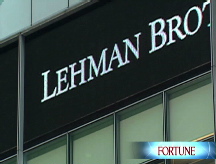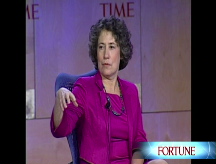Citadel under siege
Ken Griffin's $15 billion firm was flirting with disaster this fall. In a rare interview, he explains how it survived.
 |
| "What happened was not in my range of realistic scenarios," says Citadel CEO Ken Griffin. |
 |
| Fortune dubbed Citadel an "exquisite trading machine" in an unauthorized look at the firm in April 2007. |
(Fortune Magazine) -- On the morning of Friday, Oct. 24, James Forese, Citigroup's head of capital markets, picked up the phone and called Kenneth C. Griffin, the founder and chief executive officer of Citadel Investment Group, a Chicago-based hedge fund that manages $15 billion and has 1,300 employees worldwide.
For Forese, it wasn't an easy call to make, but he felt compelled to do it. People were gossiping all over Wall Street, on CNBC, and on blogs that Citadel was toast. Word had it that the firm's two hedge funds were down as much as 40%. Talk of the firm's liquidation was rampant.
Then there was the most damaging rumor of all: Griffin had been holding "secret meetings" with the Federal Reserve, looking for a bailout.
According to the scuttlebutt, Citadel was shaping up to be the next tragedy of the credit crisis - soon to be tagged and bagged alongside Bear Stearns, Fannie Mae (FNM, Fortune 500), Freddie Mac, and AIG (AIG, Fortune 500).
The firm's vital signs were in fact weak: Credit default swaps (essentially insurance) on Citadel's bonds were trading at distressed levels, priced higher than the ones on Lehman Brothers during the Friday before the investment bank declared bankruptcy.
As one of Citadel's trading partners, Forese knew the truth: Citadel's liquidity position was fine, though its flagship funds were down about 35%. So Forese told Griffin to do something that went against every clandestine bone in the hedge fund manager's body: take his case public.
"Ken, you guys are getting killed in the rumor mill," Forese said. "Most of these things are just blatantly false. If you get out there and say you're fine, it will mean a lot to the market right now."
Griffin, 40, took the advice to heart and staged a conference call in which he addressed the firm's cash position and performance. Within days, the rumors ceased and the firm stabilized - albeit with assets down about 25% from where they had been at the end of 2007.
"I have never seen a market as full of panic as I have seen in the past two months," Griffin told Fortune in a rare interview on Nov. 14 at New York's Four Seasons Hotel.
The experience of being inside the panic changed Griffin and changed his firm. Once thought of as humorless and stiff, he now comes across as more personable and even makes the occasional quip. He no longer speaks about how Citadel will become the Goldman Sachs of the 21st century.
While it may be hard to relate to a guy who buys an $80 million Jasper Johns painting (as Griffin did two years ago), the story of how Citadel clawed its way back from the abyss is a cautionary tale for any investor who would try his hand at making money in volatile markets. The firm's horrific downturn provides a lesson about the way raw human emotions like panic can trump even the smartest mathematical models.
More important, the tactics the hedge fund used to survive - preventing its investors from withdrawing en masse and opening up its books - may become trends for hedge funds in the future. He summed up this life lesson when he testified before the House Committee on Oversight and Reform in November: "Our financial markets work best when they are competitive, fair, and transparent."
Griffin, a math whiz who traded stocks from his dorm room when he was at Harvard, had until very recently succeeded in insulating his firm from risk. Since starting his hedge fund in 1990, Griffin had become a multibillionaire.
He had grown Citadel beyond a hedge fund into a diversified financial company with lucrative, fee-based businesses. Those include trading and back-office services as well as a trading platform that handles more than 30% of U.S. equity options trades and more than 8% of Nasdaq and New York Stock Exchange stock trades.
The firm seemed so solid that two years ago it effortlessly sold roughly $500 million of bonds in its first offering and was considering going public. Indeed, Citadel has been one of the most successful and consistent hedge funds over the years. The firm prided itself on using state-of-the-art technology to turn investing into a science.
Between 1998 and 2007 it notched returns of 20% a year, more than three times that of the Standard & Poor's 500-stock index. Citadel's best year ever was 2007, because its flagship fund, Kensington, rose 30%.
Part of the explanation for these healthy returns was Griffin's talent for steering clear of investing fads. He also stepped in to profit from the wreckage when hot money chased the mania of the moment. Citadel pounced on Amaranth Advisors, the $9.5 billion hedge fund that cratered over bad natural gas trades (see "The Man Who Lost $6 Billion").
Citadel bought Amaranth's positions and eventually turned a sizable profit on them. It also swooped in and bought credit portfolios of Sowood Capital Management in mid-2007 when that $3 billion hedge fund took a 50% nosedive and imploded.
After watching Long-Term Capital flame out in 1998, Griffin specifically designed Citadel to be prepared for almost any market calamity.
"We had planned for a repeat of the crash of '87. We had planned for a repeat of '98," says Griffin.
He claims, for example, that Citadel would have made it through a 1987-style crash losing just a few percentage points, or "in pretty good shape." But, he is quick to add, "the idea that the largest banks in the world would simultaneously fail, need government support, government guarantees, and/or government intervention to survive was not in my range of realistic scenarios."
Maybe if he had paid more attention to English literature back in Cambridge, Griffin would have remembered Hamlet's admonition to his risk manager: "There are more things in heaven and earth, Horatio, than are dreamt of in your philosophy."
Until Labor Day, Griffin thought he had pulled off one of the most difficult feats in investing: calling the bottom of the market. On trading desks, this strategy is also known as "catching a falling knife."
-
 The retail giant tops the Fortune 500 for the second year in a row. Who else made the list? More
The retail giant tops the Fortune 500 for the second year in a row. Who else made the list? More -
 This group of companies is all about social networking to connect with their customers. More
This group of companies is all about social networking to connect with their customers. More -
 The fight over the cholesterol medication is keeping a generic version from hitting the market. More
The fight over the cholesterol medication is keeping a generic version from hitting the market. More -
 Bin Laden may be dead, but the terrorist group he led doesn't need his money. More
Bin Laden may be dead, but the terrorist group he led doesn't need his money. More -
 U.S. real estate might be a mess, but in other parts of the world, home prices are jumping. More
U.S. real estate might be a mess, but in other parts of the world, home prices are jumping. More -
 Libya's output is a fraction of global production, but it's crucial to the nation's economy. More
Libya's output is a fraction of global production, but it's crucial to the nation's economy. More -
 Once rates start to rise, things could get ugly fast for our neighbors to the north. More
Once rates start to rise, things could get ugly fast for our neighbors to the north. More












